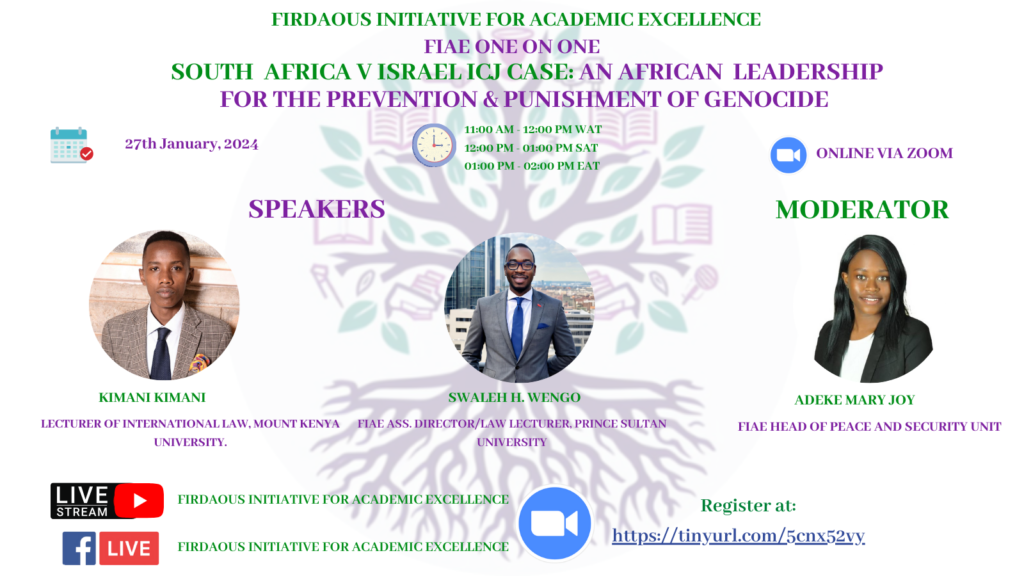On 27 January 2024, the Firdaous Initiative for Academic Excellence held its first seminar of the year, focusing on the crucial case in today’s global landscape involving South Africa and Israel. The discussion focused on the decision of the International Court of Justice regarding the request for provisional measures. The session, moderated by Ms. Mary Joy Adeke, involved Mr. Kimani Kimani, Professor of International Law at Mount Kenya University, and Mr. Swaleh H. Wengo, Assistant Director of FIAE and Professor of Law at Prince Sultan University.
The event began by retracing the events of 7 October 2023, when Hamas militants sided with Israel, resulting in the deaths of approximately 1,200 civilians. In response, Israel, invoking its right to self-defence, launched a massive attack to eliminate Hamas, bombing Gaza for over 100 days and causing over 25,000 civilian casualties. This situation led to massive displacement and a precarious food situation in the Gaza Strip. For these conditions, South Africa initiated proceedings at the International Court of Justice, accusing Israel of violating the 1948 Convention on the Prevention and Punishment of the Crime of Genocide, ratified by both Israel and South Africa.
South Africa, with a long history of solidarity with Palestine, has received criticism from Israel, which called it the legal wing of Hamas. In this regard, we recall the words of South Africa’s founder, Nelson Mandela, who said: ‘We will not be free until the people of Palestine are free’. It is clear that this will have consequences for South Africa in its trade and especially diplomatic relations with Israel and all its allies like the United States.
On 26 January 2024, the International Court of Justice in The Hague accepted the request for provisional measures, asking Israel to do everything possible to prevent genocidal acts and guarantee access to humanitarian aid. Judge Julia Sebutinde of Uganda dissented on all six provisional measures, and four of them were also voted down by Israeli-appointed judge Aharon Barak.
The proceedings, known as the ‘application of the Convention on the Prevention and Punishment of the Crime of Genocide in the Gaza Strip,’ were initiated by South Africa on 29 December 2023 at the ICJ, which is responsible for examining violations of statutory obligations, genocide being a crime with an erga omnes obligation. While criminal responsibility under the Rome Statute falls under the jurisdiction of the ICJ.
For its part, Israel challenged the jurisdiction of the ICJ in the case raised by South Africa, arguing that the acts complained of do not fall within the scope of the Genocide Convention. Mr. Kimani pointed out that the ICTY had assessed its jurisdiction in granting provisional measures, focusing on Article 36.1 of the ICJ Statute and Article 9 of the Genocide Convention. The latter, in particular, requires the existence of a dispute over the interpretation of the Convention. Israel argued that there was no reasonable opportunity to address the allegations, but the South African government pointed to numerous attempts at communication that went unanswered. The Court regarded these incidents as falling within the required definition of a legal dispute, thus conferring jurisdiction on the ICJ and holding out the hope that the Court would not decline jurisdiction at the merits stage. Mr. Wengo then emphasised the importance of the definition of a dispute, citing the Court’s jurisprudence in other cases, such as Gambia v Myanmar (2019) and Ukraine v Russia (2017), clarifying that the presence of a dispute between states is to have opposing views on the Convention and the fulfilment of international obligations, including all statements and exchanges of documents between the parties.
Many people are disappointed that a ceasefire was not ordered, which would have been the most effective way to ensure that the suffering of the Palestinian people does not continue. But, as our interlocutors point out, if the Court had already done so before the substantive phase, it would have been accused of overstepping its mandate at this stage of interim measures and not proceeding to determine whether or not Israel had the right to defend itself. So, the Court sought to ensure that the suffering of the Palestinian people was alleviated through the interim measures, pending the merits phase of the case.

